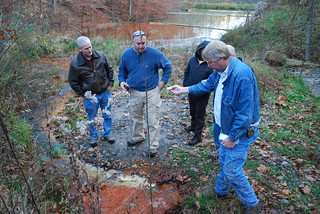Help Protect Our Water, Strengthen the General Permit for Coal Mining
Hearing is in Frankfort on Wednesday, June 18, 6-9 p.m.
at the DEP office complex at 300 Fair Oaks Lane, Room 301D
There are many reasons why the state’s draft General Permit for Coal Mining will fail to protect Kentucky’s water. In fact, in several important areas it would make matters worse by removing protections that are now in place.
Resources
KFTC Handout on the General Permit for Coal
Draft General Permit for Eastern Kentucky
Draft General Permit for Western Kentucky
Division of Water Factsheet for eastern Kentucky
Division of Water Factsheet for western Kentucky
For carpool info, contact your nearest chapter organizer.
For more information, contact Kevin Pentz, Canary Project Organizer, at 606-335-0764 or [email protected]
Written comments will be accepted until July 1. Mail to the Division of Water at 200 Fair Oaks Lane, Frankfort, Ky 40601 or email to [email protected].
Take, for example, the current prohibition against water pollution discharges under a general permit within 5 miles of a public water intake. That has helped protect the water source for the towns of Benham and Lynch in Harlan County, where A&G Coal wants to mine in the watershed where the water supply originates. But state officials want to remove that protection under the new General Permit (and perhaps it is only coincidental that A&G owner James Justice has given hundreds of thousands of dollars to various campaigns and committees of Gov. Steve Beshear and the Democratic Party).

Unfortunately, the draft General Permit for Coal Mining wastewater discharge released last month by state officials would not do this. Though it proposes limits on some pollutants that individual coal operations can discharge into streams, it does not set limits on the maximum concentrations of these pollutants in the stream itself.
There are other reasons to be concerned:
- state officials did not include a stream standard for conductivity, though there is clear science that shows most native aquatic life cannot live when conductivity rises above 500 micro-Siemens;
- the proposed permit adds for the first time limits on selenium, but uses a weak standard that will be difficult to enforce and was designed to let coal companies off the hook;
- protection of waters designated as Exceptional Waters has been dropped, and the protection for Outstanding State Resource Waters has been narrowed;
- and because state officials have refused to develop maximum in-stream loads for most pollutants associated with coal mining, the quality of Kentucky streams could actually get worse under their latest proposal.
Will you join us next Wednesday, June 18, to deliver a message to state officials that this is just not acceptable? Wear your green KFTC t-shirt if you have one, and plan to stay for the entire three hours if you can.
The General Permit for Coal Mining sets limits on what pollutants can be discharged from coal mining operations into the state’s waterways. The law requires that it be updated and renewed every five years. The current general permit expires on July 31 and the new draft will cover the next five years.
It is a flawed approach to begin with – the idea that a “one size fits all” permit can adequately protect our waterways. The draft permit further weakens stream protections by failing to acknowledge that the concentration of pollutants in the stream itself is important.
More information and analysis is available HERE.
- Home
- |
- Sitemap
- |
- Get Involved
- |
- Privacy Policy
- |
- Press
- |
- About
- |
- Bill Tracker
- |
- Contact
- |
- Links
- |
- RSS


